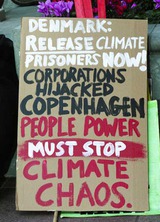
2009-12-22
by Carli Whitwell
Unless an international climate treaty is signed at the United Nations Climate Change Conference in Copenhagen next month, discussion on climate change could be a key topic at the G8 Summit in Huntsville in June, says an international relations expert.
“If there’s not a comprehensive, legally binding agreement coming out of Copenhagen, everyone is talking about taking the year 2010 to move … to a treaty at the next council of the parties,” said Matthew Hoffmann, a political science professor at the University of Toronto, who specializes in climate change.
“Because the G8 meeting will essentially be halfway between Copenhagen and the next meetings, there’s a chance that that will be a major focus of discussion because especially the G20 countries will be in the midst of trying to hammer out a more comprehensive agreement.”

The international meeting in Denmark’s capital was once poised to be the place where a successor to the Kyoto protocol would be signed. That changed in the past few months, mostly because the United States won’t take on an international commitment without congress and senate support, said Hoffmann.
“With the U.S. not willing to take a real strong position in Copenhagen, that makes the rest of the world less likely to move on a legally binding agreement,” he said.
Canada, like the rest of the world, is in wait-and-see mode, he added.
That’s not enough for Local Environment Advisory Forum (LEAF) and green plan task force member Andrea Smith, who wants a binding agreement decided as soon as possible.
Canada pulled out of its Kyoto commitments to reduce emissions to below 1990 levels. Today, emissions are at about 25 per cent more than they were two decades ago.
“It just puts off action on climate change even further and we’re at the point where we don’t really have the luxury of waiting any longer. We’re getting toward a tipping point,” Smith said.
It’s also been reported that Prime Minister Stephen Harper will not be attending the meetings, which take place Dec. 7 to 18. Hoffmann said because an agreement may not be signed, it’s likely many leaders will send representatives instead.
Still, it sends a message, says Smith. “It confirms to the international audience that we’re not taking climate change seriously.”
The Prime Minister’s Office did not return a request for comment to confirm whether the prime minister would be attending.